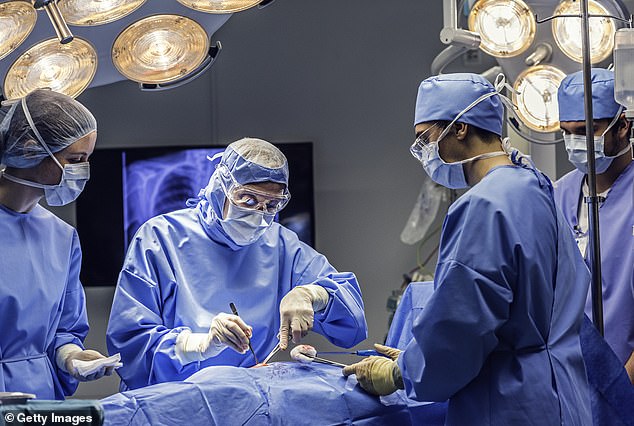According to research, listening to music can help speed up a patient’s recovery from surgery.
Experts have found that playing some of your favorite songs, whether through headphones or a speaker, can reduce pain and anxiety levels after surgery.
It can also cause the patient to need less morphine and cause a lower heart rate, which can be key to recovery.
The team, from California Northstate University School of Medicine, analyzed 35 existing studies on music and its role in helping people recover from surgery.
They found that, overall, simply listening to music after surgery had noticeable effects on patients during their recovery period.
Listening to your favorite music can reduce pain and anxiety levels after surgery (file photo)

Music can help ease the transition from the awakening stage to returning to normal and can help reduce stress around that transition (file photo)
For example, they reported up to a 19 percent reduction in their pain levels and a 3 percent reduction in anxiety.
Patients who listened to music used less than half the amount of morphine compared to those who did not listen to music on the first day after surgery.
And those who listened to melodies also experienced a reduced heart rate (about 4.5 fewer beats per minute) compared to those who didn’t.
The researchers said this is important because keeping the patient’s heart rate within a healthy range helps improve recovery by allowing effective circulation of oxygen and nutrients throughout the body.
“When patients wake up after surgery, sometimes they feel really scared and don’t know where they are,” said Eldo Frezza, lead author of the study.
“Music can help ease the transition from the awakening stage to returning to normal and can help reduce stress around that transition.”
Dr. Frezza and his co-authors noted that unlike some more active therapies such as meditation or Pilates, which require considerable concentration or movement, listening to music is a more passive experience and patients can incorporate it without much cost or effort almost immediately. after surgery. .
“Although we can’t specifically say they feel less pain, studies have shown that patients perceive they feel less pain, and we think that’s equally important,” said Shehzaib Raees, first author of the study.

Simply listening to music after surgery had notable effects on patients during their recovery period (file photo)

The team said a reduction in levels of cortisol (the body’s stress hormone) when listening to music may help ease patients’ recovery from surgery (file photo)
‘When you listen to music, you can dissociate and relax. That way, you won’t have much to do or focus on and you can calm down.’
The team said that a reduction in cortisol levels (the body’s stress hormone) from listening to music may play a role in easing patients’ recovery from surgery.
Further research will involve evaluating the use of music in the surgical setting and in the intensive care unit.
Dr. Frezza said he would recommend listening to any music you enjoy after surgery, if you’re feeling up to it.
“We are not trying to say that one type of music is better than another,” he added. “We think music can help people in different ways after surgery because it can be comforting and make you feel like you’re in a familiar place.”
The findings were presented at the American College of Surgeons Clinical Congress in San Francisco.


